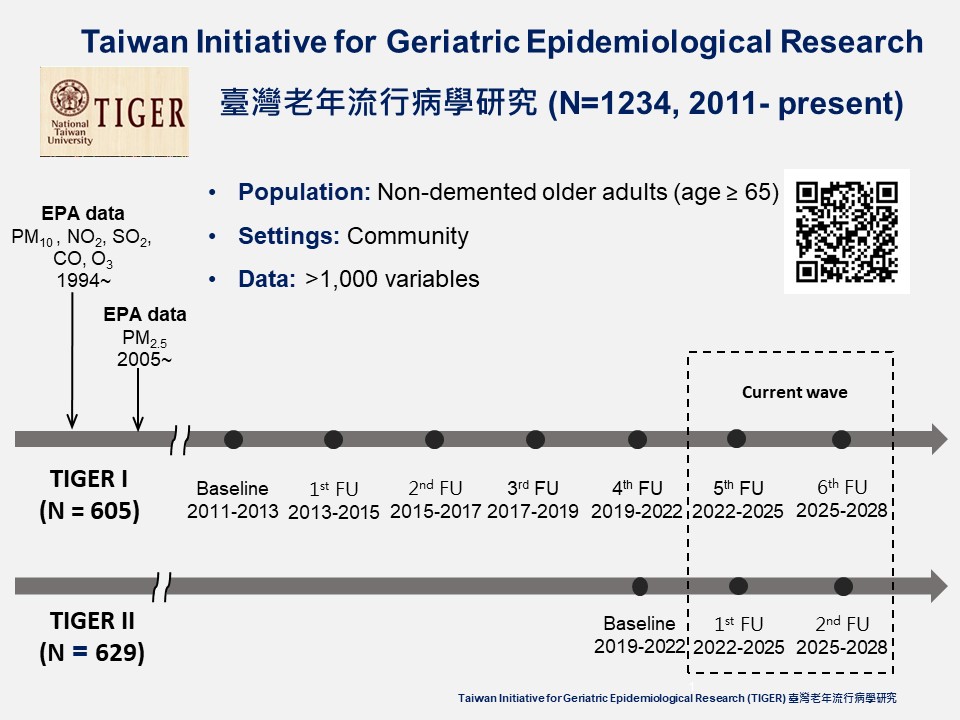PROJECTS
World Health Organization (WHO) global plan on dementia was announced on May 29, 2017. One of the plans is "Dementia: a public health priority". Our lab has focused on cognitive function and dementia epidemiologic research from 2007. Alzheimer's disease (AD) is the most common type of dementia and has no effective cure so far. Therefore, it is important to prevent AD before its onset. AD is a complex and multifactorial disease, and its onset is attributable to clinical factors, genetic susceptibility, lifestyle and environmental factors. Therefore, we are hoping to integrate these factors to predict AD risk at the preclinical phase or at the early stage of dementia (mild cognitive impairment) in order to facilitate early prevention. In addition, we also explore health issues related to the elderly (e.g., osteoporosis) and collaborated with Harvard School of Public Health for the prostate cancer research. Below is the introduction of these research.

Taiwan Initiative for Geriatric Epidemiological Research (TIGER, 2011-present)
At baseline (2011–2013), the Phase I of TIGER (TIGER I) cohort study recruited approximately 605 older adults aged 65 and above. As the study progressed, participant follow-up attrition occurred. To address this, Phase II of TIGER (TIGER II) was conducted from 2019 to 2021, enrolling an additional 629 older adults, bringing the total cohort to 1,234 participants.
This study focuses on health-related issues in older adults, including cognitive function, dementia, frailty and sarcopenia changes over time. Since baseline, follow-up assessments have been conducted every two to three years. The study includes cognitive function evaluations, collection of biospecimens, imaging data, and various questionnaire-based information (e.g., demographics, lifestyle, environmental exposure, disease history, and medication use).
Through collaboration with clinical specialists in geriatrics, neurology, medical imaging, internal medicine, psychiatry, and ophthalmology, as well as experts in biostatistics, nutrition, environmental health, metabolomics, and spatiotemporal environmental analysis, we have identified several key dementia risk factors. These include dietary patterns unique to Chinese ethnic populations, diet quality, lifestyle factors, long-term air pollution exposure, retinal nerve fiber and vascular complexity, kidney function, and brain imaging markers. We hope these findings contribute to the early prevention of dementia. TIGER Cohort Profile and findings related to this cohort, please refer to “Publications”.

TIGER has joint and collaborate with international research teams in the following consortium:
1) The Global Alzheimer’s Association Interactive Network (GAAIN) funded by the Alzheimer’s Association, USA, in 2018,
2) The United Consortium in the Netherlands in 2021,
3) Cohort Studies of Memory in an International Consortium (COSMIC), Centre for Healthy Brain Ageing (CHeBA), School of Psychiatry, University of New South Wales, Sydney, Australia in 2022, and
4) Environment Working Group, Enhancing Neuro Imaging Genetics Through Meta Analysis (ENV - ENIGMA), University of South California, Los Angeles, USA, in 2023.
We are looking forward to more collaborations via data sharing. For those who are interested in collaboration or data sharing, please contact Dr. Yen-Ching Karen Chen at karenchen@ntu.edu.tw.

Dementia and Aging Research of Taiwan (DART: 2007-2011)
This is a multi-center case-control study in Taipei, Taiwan. A total of 938 participants aged 60 or older (n=292 AD, n= 143 small-vessel vascular dementia (VaD), and n=503 healthy controls) were included from 2007 to 2011. This study has genome-wide (using customized array plates for Chinese population) and candidate-gene data [including apolipoprotein E (APOE) e4 status and 39 single nucleotide polymorphisms (SNPs) of 12 genes], information of demography, comorbidities, and leisure activities.
GAAIN ( The GAAIN (Global Alzheimer’s Association Interactive Network) is funded by the Alzheimer’s Association, USA. It has developed the first operational online integrated research platform, which links scientists, shared data, and sophisticated analysis tools. Our Dementia and Aging Research of Taiwan (DART) has joint GAAIN in September in 2016. We are looking forward to more collaborations via data sharing. For those who are interested in collaboration or data sharing, please contact Dr. Yen-Ching Karen Chen at karenchen@ntu.edu.tw.
Osteoporosis Project
About 10 million and 34 million of Americans have osteoporosis and low bone mass, respectively. Among them, 80% are women who are at high risk of fracture. Osteoporosis is a common health issue among postmenopausal women and over 50% of this population has increased risk of fracture. WHO reported that osteoporosis has been an important health issue secondary to coronary heart disease. Although osteoporosis is preventable and curable, no clear symptoms could be identified before the occurrence of fracture, which is associated with higher mortality. Family studies found that 30% to 80% of variations of bone mineral density were attributable to genetic factors. However, previous candidate-gene association studies observed inconsistent findings. Therefore, the etiology of osteoporosis remains unclear. Recently, GWASs found that some single nucleotide polymorphisms (SNPs) were associated with bone mineral density and osteoporosis. In addition to genetic markers, our lab also look into metabolome, various clinical factors and lifestyle in relation to the risk of low bone mineral density.
Prostate Cancer Project
Prostate cancer (PCa) is the most common non-skin cancer and the 2nd cancer cause of death among men in the USA. PCa is the 6th common cancer and its incidence remains elevated in Taiwan (Cancer Registry System, 2011). Since 2003, we have collaborated with Harvard School of Public Health and Channing Laboratory, Brigham and Women's Hospital, Harvard Medical School on the prostate cancer project. Several articles have been published based on the data from Health Professionals Follow-Up Study (HPFS) with a recent work on the interactions between TLR4 genetic polymorphisms and the infection of Trichomonas vaginalis. We also have papers using the Prostate Cohort Consortium Project, National Cancer Institute, USA. We initiated a PCa international collaborative project, this meta-analysis assessed genetic polymorphisms of TLR4 and PCa has been published in 2014, which may help unraveling the etiology of PCa.
